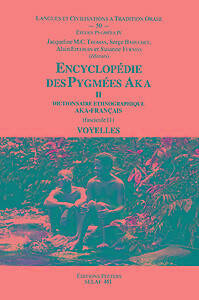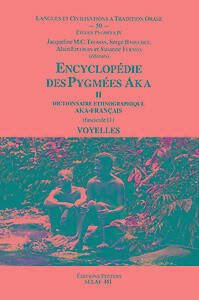
- Afhalen na 1 uur in een winkel met voorraad
- Gratis thuislevering in België vanaf € 30
- Ruim aanbod met 7 miljoen producten
- Afhalen na 1 uur in een winkel met voorraad
- Gratis thuislevering in België vanaf € 30
- Ruim aanbod met 7 miljoen producten
Zoeken
Encyclopédie des Pygmées Aka II: Dictionnaire ethnographique aka-français. Fasc. 11: Voyelles
€ 62,00
+ 124 punten
Omschrijving
English summary: This work is part of a larger series of studies on the Aka Pygmies of Central Africa. This linguistically-based approach brings together specialists from domains as diverse as anthropology, ethnolinguistics, ethnobotany, and ecology. The first book offers a substantial ethnological and linguistic introduction. The second is an Aka-French dictionary with over 10,000 terms defined and illustrated. The importance of this work lies in the particular linguistic situation of the Aka Pygmies who speak a language that was not originally their own, that was borrowed from the non-forest dwelling peoples around them and that would supposedly lack the terms necessary for this people so intimately familiar with their forest environment. The comparative study of their vocabulary sheds light on the modified relations caused by the increasing destruction of their habitat, and on the constraints of a socio-economic process that is leading them towards the status of an exploited and discredited sub-proletariat. French description: Cet ouvrage s'inscrit dans une suite de travaux consacres aux populations forestieres d'Afrique centrale et, parmi elles, plus particulierement aux Pygmees Aka. L'interet de l'etude de cette population reside dans le caractere tres particulier de sa situation linguistique, sociale et politique. Cette ethnie parle une langue qui aujourd'hui lui est propre, bien que manifestement empruntee a un moment de son histoire a un groupe de Grands Noirs (bantu C 10), mais les conditions de relations avec son voisinage modifient constamment sa situation linguistique. Chasseurs-collecteurs, ils ont une parfaite connaissance de leur milieu forestier auquel ils presentent, de toutes les populations forestieres locales, la plus harmonieuse adaptation. Cependant, ces maitres de la foret, reconnus comme tels par tous, n'auraient pas de vocabulaire propre de leur domaine, si l'on en croit leur appartenance linguistique. L'origine non forestiere des populations environnantes, auxquelles ils devraient leur nomenclature, rend cette hypothese inconcevable. L'examen comparatif de leur vocabulaire eclaire la question d'un jour different. De nos jours leur foret, de plus en plus devastee par une exploitation abusive, ne leur offre plus qu'un aleatoire et precaire refuge. Les relations d'echange assez egalitaires qu'ils entretenaient depuis des temps immemoriaux avec les Grands Noirs se sont recemment modifiees a leur desavantage. Engages malgre eux dans un processus socio-economique contraignant, ils s'acheminent vers un statut de sous-proletariat exploite et deconsidere. Ils restent pourtant les ultimes temoins d'une des dernieres civilisations ou l'homme sait exploiter la nature pour en vivre, sans la detruire.
Specificaties
Betrokkenen
- Uitgeverij:
Inhoud
- Aantal bladzijden:
- 303
- Taal:
- Frans
- Reeks:
- Reeksnummer:
- nr. 461
Eigenschappen
- Productcode (EAN):
- 9789042929258
- Verschijningsdatum:
- 31/12/2013
- Uitvoering:
- Paperback
- Formaat:
- Trade paperback (VS)
- Gewicht:
- 2489 g

Alleen bij Standaard Boekhandel
+ 124 punten op je klantenkaart van Standaard Boekhandel
Beoordelingen
We publiceren alleen reviews die voldoen aan de voorwaarden voor reviews. Bekijk onze voorwaarden voor reviews.










